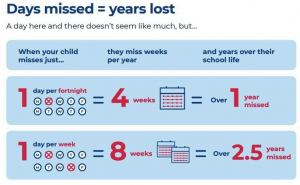The Importance of Attendance
We all recognise that education is the pathway to the future. The key to educational success relies on being present at school.
Consistent routines and practice are a big component of learning. Neurological pathways in our brains require repetitive exposure to strengthen and cement learning and develop mastery. We also create these neural pathways for resilience, perseverance, and discipline.
Everyone knows that a good sports team or musician requires regular practice, so we must apply the same principles to our educational pathway at school. Please help ensure your child has the best opportunity for success by making sure they are at school every day.
Why is it so important to attend school every day?
- Learning is a progressive activity; lessons build on each other.
- Reading the material and completing work independently does not compensate for the loss of insight gained during class discussions the extra information gained through explanation & supervised activities.
- Teachers use discussions, demonstrations, experiments and participation as part of the daily learning activities. These cannot be made up by those who are absent.
- Regular student participation in daily classroom activities plays a significant role in a student’s school success.
- Maintaining relationships with teachers and peers.

Our attendance procedures:
- Teacher marks roll in the morning
- Known absences are coded by administration staff
- Classes are checked to ensure students have not arrived late without signing in.
- Text sent to whānau requesting reason for absence from class.
- If no contact is received from whānau, then the student is marked truant at the end of the day, (if contact is received after the absence then this mark is changed to accurately reflect the reason).
- After 10 half days continuous absence (generally a week or so) administrator discusses it with the classroom teacher. Whānau contacted with offers of support. Referrals made if necessary.
- If still no attendance then it is referred to the principal and she will respond with a phone call, or home visit and more offers of support to encourage attendance. The truancy service may be involved.

Unfortunately, the reasons for some absences, do not fall within our school or Ministry policy as a justifiable reason for students to miss school. An unjustified absence is an absence that is either unexplained or, explained, but the explanation is not within the school’s policy as an acceptable reason for the student to be away from school, for example,
- No information or throw-away explanation
- Absent with an explained but unjustified reason
- Holiday during term time
- Unknown reason
In terms of an unjustified absence, we are restricted by the Ministry of Education’s guidelines, which means that the responsibility for the absence rests with the parents. Please be aware that for unjustified absences it is not a requirement of our staff to make special arrangements for work to be provided or to supervise students to catch up on missed work.
We acknowledge that many families have strong links to overseas. If a holiday is taken in term time then it is marked accordingly and falls into the category of unjustified. We are able to justify 5 days for cultural reasons, this is relevant if a family is visiting their home country. We encourage children on holiday with their whānau to;
- Use the ‘learning at home’ page on our school website. This has links to useful websites for learning;
- Download the Libby app on a tablet or smartphone. This allows you to borrow digital or audiobooks from your local library. This means you don’t have to travel with lots of books;
- Keep a diary (written or digital) of your adventures;
- Take lots of photos;
- Email us photos and stories to share with the class;
- Upload learning to the ‘learning at home’ page on Hero:
- Enjoy and relish the experience and travel offers!

Recent Comments